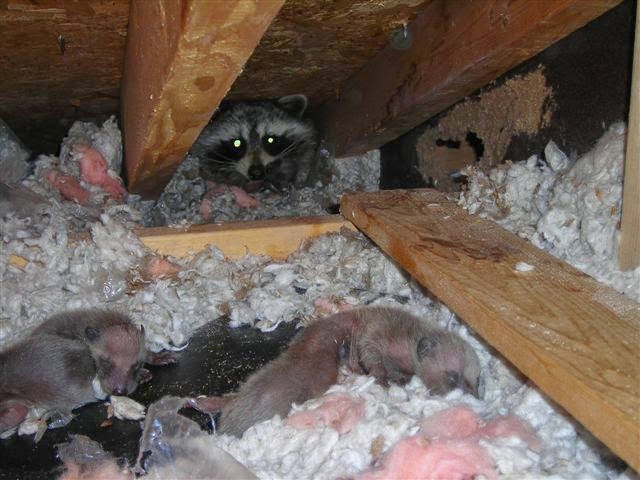Nature’s nefarious bandits are an annual concern for many Canadian residents and Durham is no exception. Raccoons will make their way onto human occupied premises and inadvertently create a stir in the lives of the occupants. Naturally, therefore, Oshawa’s residents, are always on the lookout for ways to control raccoon behaviour. Knowledge of the animals’ behaviour, such as their mating and breeding habits will help residents to find safe, humane and effective raccoon control strategies for their Oshawa properties.
Raccoons’ Annual Breeding Cycle
January marks the beginning of raccoons’ annual breeding season which ends in April. During the breeding season, the raccoons are very active. By early summer, many new baby raccoons enter the world. They are vulnerable at this point and need the constant care and nurturing of their mothers. Nursing mothers often anticipate this need and start the search for dens before giving birth. Sometimes though, they may switch dens, carrying their kits with them. This is why Oshawa residents see more raccoons on their properties during this period.
When it is time, raccoon mothers seek safe comfortable spaces in which to nurture their young. Sheds, garages, crawl spaces and sometimes attics are among the popular options for raccoon dens. A raccoon in your space during this time is very likely to be a mother raccoon nursing her kits. Each female raccoon can give birth to as many as three kits at a time.
When domestic space becomes raccoon space, even temporarily, a number of problems arise. One problem is the fact that raccoons damage certain material (insulation, electrical wiring, plastic piping, and wooden structures to name a few) and leave property owners with hefty repair bills.
Why you Should Avoid DIY Raccoon Control Measures
DIY raccoon removal is always discouraged by animal control experts because these methods can often be cruel to the animal. In addition to this, these methods are more than likely ineffective. Without proper training and knowledge of the animals, attempting to remove raccoons on your own could make the problem worse. Many people who have attempted to remove the animals on their have suffered from the defensive tactics of mother raccoons trying to protect her kits from what they perceive to be a threat. Once a wild raccoon scratches or bites a human being, concerns about rabies will arise. Wild raccoons, like many other wild animals, are potential carriers of this and other diseases.
Raccoon Invasion? Call in the Experts Quickly!
Residents who encounter raccoons on their property should always consider expert removal as their first option. Experts such as Skedaddle who specialize in humane raccoon removal are able to get raccoons off your property safely and effectively. We also take great care to ensure that any babies removed from the home are properly reunited with their mother and increasing their odds of survival.
Skedaddle’s wildlife technicians are also able to prevent raccoon encounters in anticipation of the high activity seasons (such as the breeding season). Through the installation of safe raccoon barriers that prevent the animals from accessing the property along with the installation of devices that encourage the animals to stay away. Of course, this is done after the area is thoroughly inspected to ensure that no raccoons have taken up residence inside. When this is done, the sealing of potential raccoon access points can take place as the wildlife technician and property owner can rest assured that none of the animals will be trapped inside.With Skedaddle on the job for raccoon control, Oshawa residents can breathe easy knowing that they are eliminating their raccoon problems but not the raccoons themselves.



